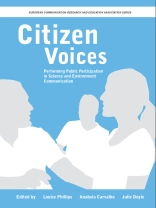This book concentrates exclusively on the dialogic turn in the governance of science and the environment. The starting point for this book is the dialogic turn in the production and communication of knowledge in which practices claiming to be based on principles of dialogue and participation have spread across diverse social fields. As in other fields of social practice in the dialogic turn, the model of communication underpinning science and environmental governance is dialogue in which scientists and citizens engage in mutual learning on the basis of the different knowledge forms that they bring with them. The official aim is to involve citizens in processes of decision-making on scientific and environmental issues, including issues relating to the built environment such as urban planning. The attempt in this book has been made to build bridges across the fields of science and technology studies, environmental studies and media and communication studies in order to provide theoretically informed and empirically rich accounts of how citizen voices are articulated, invoked, heard, marginalised or silenced in science and environment communication.
Table des matières
Chapter 1: Introduction – Louise Phillips, Anabela Carvalho and Julie Doyle
PART I: Public Participation and Media
Chapter 2: When Citizens Matter in the Mass Mediation of Science: The Role of Imagined Audiences in Multidirectional Communication Processes – Ursula Plesner
Chapter 3: Contested Ethanol Dreams – Public Participation in Environmental News – Annika Egan Sjölander and Anna Maria Jönsson
Chapter 4: Citizen Action and Post-Socialist Journalism: The Responses of Journalists to a Citizen Campaign against Government Policy towards Smoking – Pavel P. Antonov
Chapter 5: Discourse Communities as Catalysts for Science and Technology Communication – Hedwig te Molder
Chapter 6: Online Talk: How Exposure to Disagreement in Online Comments Affects Beliefs in the Promise of Controversial Science – Ashley A. Anderson, Dominique Brossard, Dietram A. Scheufele and Michael A. Xenos
PART II: Public Participation and Formal Public Engagement Initiatives
Chapter 7: Communicating about Climate Change in a Citizen Consultation: Dynamics of Exclusion and Inclusion – Louise Phillips
Chapter 8: Public Engagement as a Field of Tension between Bottom-up and Top-down Strategies: Critical Discourse Moments in an ‘Energy Town’ – Anders Horsbøl and Inger Lassen
Chapter 9: The Stem Cell Net Work: Communicating Social Science through a Spatial Installation – Maja Horst
Chapter 10: Issue-centred Exploration with a Citizen Panel: Knowledge Communication and ICTs in Participatory City Governance – Pauliina Lehtonen and Jarkko Bamberg
A propos de l’auteur
Louise Phillips is associate professor in the Department of Communication, Business, and Information Technologies at the University of Roskilde.












